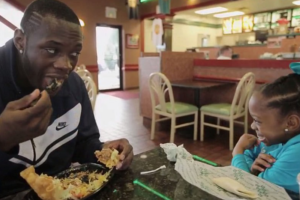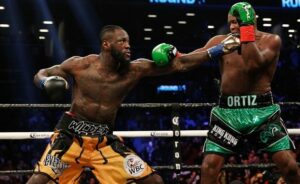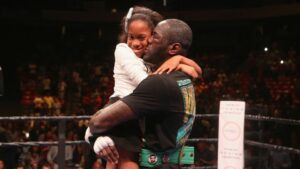World champion. Olympic medalist. Father. Proud Tuscaloosan. Entertainer.
It was that last adjective that hung awkwardly from the silence during my conversation with WBC heavyweight World champion, Deontay Wilder, way back in November 2017. He’d just bludgeoned Bermane Stiverne, with the hopelessly overmatched Haitian folded in half across the bottom rope in the opening round.

‘Entertainment’,he told me, was what the people wanted. It was his staunch defence when questioned about statements that he wanted a ‘body’ on his record.
The grandson of a pastor and the son of a minister in Alabama, Wilder had come from a family of respect. His career within the squared circle had been colourful, with brutal knockouts and exhilarating contests at almost every outing. After being poked-and-prodded by his peers for his families religious background, Deontay became a hardened version of the young man who was forced to overcome bullying without the experience of negativity at home, shielded from modern media.
Fighting wasn’t always Wilder’s life. Infact, it’s debatable that a need for violence pulses through his veins, even now. He was a promising athlete, with a solid career in basketball and, more notably, American football as a wide receiver. Boxing, unusually, hadn’t even crossed his mind. However, family was never far from his thoughts and after having a young daughter of his own, the trajectory of the young Alabama man’s career drastically altered.

“Without a great test, you can’t have a great testimony”, Wilder stated poignantly during the final press conference ahead of his duel with Tyson Fury. His first daughter was born with spina-bifida, a birth defect causing issues with the child’s backbone, leading to serious issues with walking and fluid in the brain in some instances. Boxing may not have been an aspiration, but it was an opportunity. The tall, muscular, powerful athlete transitioned from football helmets to headgear in search of the money required to fund her medical care.
It’s important to remember his motivation. Recently, his career has been shrouded in controversy with press releases and audio snippets proclaiming his need for that ‘body’. That seemingly genuine hunt for death between the ropes had turned many against him, especially in boxing’s current climate of tragedy. When I spoke to Deontay about those comments and questioned whether they were merely a PR stunt, his response was worryingly blunt.
“You [fans] paid your money to see this? We signed a contract to give you entertainment. If I’m not gonna give you the best of me, then I don’t want you to come and see me! So does that mean I gotta end another mans life?! Well, you helped me out with the cost of coming to see it.”

It seemed, at that time, a statement born of frustration. Wilder hadn’t received the plaudits he felt he deserved. His string of opponents and his lack of money-spinning bouts had drawn criticism. Bermane Stiverne represented a chance to make a statement – knock out the only man who had taken him thirty-six minutes and truly put the division on notice. I doubted his true desire to kill an opponent and since then, he has added his stoppage victory of Luis Ortiz to an otherwise questionable resume.
That night against the ageing Cuban had risen the thirty-three-year-old’s stock amongst the boxing purists. He struggled in stages and rallied to overcome the Pacific storm, battering ‘King Kong’ towards the end of the tenth round. Was it now eventually the time for Deontay to dominate the heavyweight landscape? On Saturday, we’ll know for sure.

One thing the pair shared that night was a common affliction of their beloved offspring. Luis Ortiz himself has a daughter with medical issues and both men shared a heartwarming moment after the fight. It revealed the deeper meaning behind Deontay’s quick-fire rise through the amateur ranks and into the professional game, only reinforcing that sensitive aspect of his character. The family man is always present, even if he sits behind the mask.
After watching Deontay conduct himself eloquently during the press conference, speaking well and telling his story, I was happy to see the controlled passion as the two fighters exchanged barbs. Three minutes later, however, Fury had his shirt off and Deontay was throwing his hands in the air as his entourage serenaded Frank Warren, who looked suitably too old for that particular battle. That rapid switch from relaxed to relentless further enhanced the many faces of the USA’s first heavyweight champion in that barren nine-year spell.
 He’s taken enough s*** from enough people. It seemed to hang over him like a dark cloud, that need to be taken seriously as a man and a provider. Tyson Fury ridiculed him and downplayed his achievements, with Wilder replying, “I took up boxing late and made the Olympics in a year-and-a-half, and medalled!”. A remarkable achievement in sleepy Tuscaloosa as one of only 100,000 residents.
He’s taken enough s*** from enough people. It seemed to hang over him like a dark cloud, that need to be taken seriously as a man and a provider. Tyson Fury ridiculed him and downplayed his achievements, with Wilder replying, “I took up boxing late and made the Olympics in a year-and-a-half, and medalled!”. A remarkable achievement in sleepy Tuscaloosa as one of only 100,000 residents.Deontay Wilder wears the title of Olympic bronze medalist with pride. He was never supposed to be there and has carved a career from nothing, on the strength of paternal love. He captured a portion of the heavyweight World title in favourable circumstances, but has been like a wrecking ball in his latest attempts to fight the best – don’t forget he was ready to fly to Russia and battle Alexander Povetkin. He’s an entertainer, for sure. He has constantly delivered with exciting finishes and simply devastating power which is plenty for fans around the globe – without a ‘body’.

Deep down, the title that weighs heaviest on his heart is ‘father’. It’s central to his World and always has been. It was his reason for squeezing into gloves for the first time and his only motivation to trade punches to the head with giants. Home is truly where the heart of Wilder lies as he strives to provide for his four young children; Ava, Dereon, Deontay Jr and Naieya.
With more faces than a clock, his time is now.
Article by Craig Scott
Follow Craig on Twitter at: @craigscott209